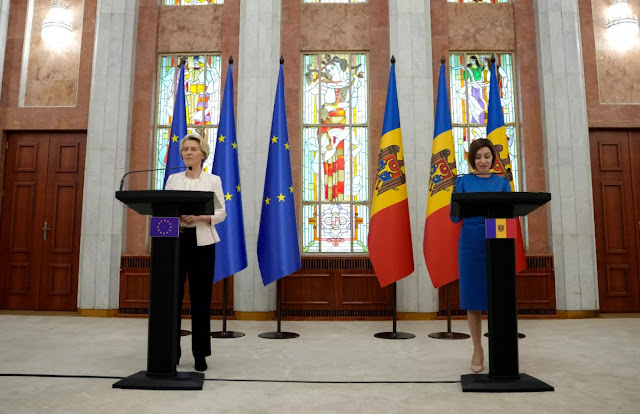European leaders are gathering in Moldova on Thursday for a political summit spotlighting a country heavily impacted by Russia’s war in Ukraine.
This second summit of the European Political Community will see nearly 50 leaders discuss peace and security issues as well as energy and climate.
Moldova's President Maia Sandu said at the opening of the summit that the European Political Community could "grow into a key platform for pan-European action for security, for peace, for Europe."
Ukrainian President Volodymyr Zelenskyy, who attended the summit in person, warned that Europe should not have doubts about security, EU unity, or meeting the challenges of our time.
He said that a "clear invitation" to NATO and a "clear positive decision" on Ukrainian EU accession were needed as he warned against Russian aggression.
What is the European Political Community?
French President Emmanuel Macron first called for the new forum for diplomacy in a speech at the European Parliament on 9 May 2022 as a way of discussing security challenges such as the war in Ukraine with non-EU countries.
"The European Union, given the level of its integration and ambition, cannot be in the short term the only means of structuring the European continent," Macron said.
“It’s our historic obligation to respond to that today and to create what I would call a European political community."
He described it as an organisation that would allow democratic nations to cooperate on a number of key issues.
The inaugural meeting of the new community took place last October in Prague, with leaders saying the summit provided an opportunity to discuss common challenges on the continent.
European Political Community debate: what's the deal with Europe's new club of nations?
'Important moment for Moldova'
European Commission President Ursula von der Leyen said ahead of the second summit that Moldova is the "heart of Europe" and that the EU supports the country "every step of the way".
An EU official said in a briefing ahead of the second summit that they were impressed by Moldova’s preparations for the European Political Community meeting.
Those include security considerations including NATO surveillance flights guarding the skies above the country.
"Organising (the summit) in Chișinău is a strong symbolic support, that in these difficult times, Moldova is not alone," Vadim Pistrinciuc, director of the Moldovan think tank the Institute for Strategic Initiatives and a former member of the country's parliament, told Euronews.
"It is a message with strong security implications: regardless of the Russian aggression in Ukraine, the security challenges Russia generates in Moldova – Moldova is not alone, a small country can be in the centre of European support," he added.
He said it was also a moment for Moldova, a former Soviet country bordering Ukraine and Romania, to convince EU governments about the seriousness of their goal of joining the bloc.
Moldova was granted EU candidate status in June 2022 along with Ukraine a few months after Russia launched its invasion of Ukraine.
The country's pro-Western government has repeatedly warned of Russian interference since the beginning of the war in Ukraine.
Missiles have crossed into Moldova's airspace and debris has landed there due to the war.
Pistrinciuc said the summit will also be a forum where Moldova can draw attention to its security challenges.
“For Moldova, the photo opportunity is equally valuable to shore up flagging public morale, in the context of tense social and political situation,” wrote CSIS experts Ilke Toygur and Mathieu Droin in an article ahead of the summit.
“The country has never received such a high-profile event in its history; therefore, the summit will be a live resilience test.”
Irish Taoiseach Leo Varadkar said: "We think Moldova's future is in the European Union," upon arriving for the summit, adding that it was his first visit to the country.
One of the important side meetings of the summit will include the leaders of Armenia and Azerbaijan with other EU leaders. European Council President Charles Michel said he hoped the meeting would "be the occasion to find a common political will to normalise the relationship between the two countries."




0 Comments